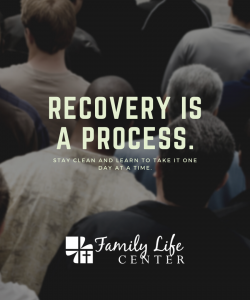
Recovering from addiction is not an easy or straightforward path. The path to recovery is unique for every individual, but there are lessons that can be learned from others who have reached and maintained their sobriety. We’re sharing the advice of one of our experienced counselors with you this month:
Emily Couch is a member of the Family Life Center family here to help you on your path.
As a person with sustained recovery, I often get asked, “What did you do to make your recovery work?” It’s honestly a brilliant question. Recovery is a hard battle, so it is beneficial to have a war plan when approaching this topic. The following are pieces of advice, solid quotes, and bits of information that I have gathered over the last few years; they are things that have worked in my recovery, and I hope they will be helpful to you as you explore what recovery looks like for you.
It works if you work it
This saying is quite popular among 12-step support groups such as Narcotics Anonymous and Alcoholics Anonymous. I have heard it probably a thousand times since being in the rooms, but it holds the same weight today as it did when it was first introduced to me. Recovery is hard. It is not something that another person can do for you. Be ready to put in the work to make your recovery a reality. Once you have reached that point, the doors of possibility open up. Go to meetings. Get (and actually call) your sponsor. Serve other people. Do the work. Don’t quit until the miracle happens.
Takeaway: I have to take responsibility for my recovery, and I am the only person who can do the work it takes to start and maintain my recovery journey.
Recovery is not a one-size-fits-all deal
- NA. CA. Celebrate Recovery. SMART Recovery. Recovery Dharma. The list goes on of all the available sober support groups. It can be overwhelming attempting to figure out the “right” path to recovery. There is an old saying–”Different strokes for different folks.” Not every support group will meet your needs…and that is okay. The important thing is finding a sober support network and getting plugged in. Don’t be afraid to try different sober support groups until you find the perfect fit for you.
Takeaway: Just because something works for one person does not mean it will work for me. I must try different things until I find the fit that supports my recovery.
Get in the middle of the boat
The beautiful thing about sober support groups is that they allow you the opportunity to network with other people in recovery. You get to meet people from all walks of life, some similar to you and some not so similar, and you do life with these people. As you regularly attend, you can begin to detect those individuals who have what you want for your own in their recovery. Build relationships with those people. Ask one of them to be your sponsor. Hang out outside of meetings. As you surround yourself with these people, you pick up on the things that make their recovery work, and you can try them for yourself. Not only that, but it is your sober support network that will be there for you when the bad days hit (and they will crash). It does not mean recovery is a journey one must walk alone–it is about community. We lift each other up. As you start your recovery journey, you must begin making connections with people who will support you through the good times and the bad.
Takeaway: I need to surround myself with people who have what I want in recovery and who will support me in my recovery journey.
We keep what we have by giving it away
Maybe you are new to the recovery world, or maybe you have some clean time under your belt. Either way, this piece of advice applies to anyone who is walking the road to recovery. As I mentioned earlier, we do not mean recovery to be a journey walked alone. Everyone in recovery, from those who have less than 24 hours sober to those who have multiple years sober, benefits from hearing the stories of others. Even though your account may not be the same as the person sitting next to you, we all go through struggles in life. Sharing how you deal with those situations can help another person who is similarly struggling. I am a firm believer that things happen for a reason and that we can usually break the causes down into two broad categories–(1) the lesson we learned taught us something, or (2) the lesson we learned was used to help others. Whether in recovery, every person has experienced joy, peace, and excitement; they have also experienced pain, hardship, and loss. When we use our stories to help other people, we maintain our own recovery. It serves as a reminder of where we have been and where we are going.
Takeaway: When I share my story with others, I strengthen my own recovery.
Do not be so quick to judge
Every person in recovery experiences a wide variety of feelings. It is also common for various thoughts to enter one’s mind to heal. Regarding feelings, remember this: do not hide them. Feel your feelings. Also, remember this: do not let them overtake you. Feelings are not facts. Feel your feelings and let them go. Regarding thoughts, remember this: Not every idea has to be stored away in your brain. Sometimes it is best to acknowledge the thought and let it go. This is especially true regarding feelings of shame. Shame is simply put, not liking yourself as a person. Shame serves no place in recovery. It is also true when you have thoughts about using. (I’m going to talk more on this one next.) Acknowledge the thoughts and let them go.
Takeaway: It is vital that I feel my feelings without becoming them. It is also important that I acknowledge my thoughts without needing to dwell on them or store them away. It is okay to let them go.
Thoughts are not actions
This one is huge. I am a perfectionist in every aspect of my life, including recovery. For the longest time in early recovery, I thought I had failed if I had any thoughts about using or cravings. Here’s the deal, friends: we are addicts. Our brains’ chemistry differs from other people’s (and that’s another lesson for another day). It is practically impossible for a person working towards recovery to never have thought about using again. Thoughts and cravings are expected as our brain works to heal itself. You used these substances for a while–it takes time for your brain to rewire. The important thing is that you do not ACT on those thoughts. Our actions bring about consequences, so make sure that your actions match what you want for your recovery.
Takeaway: I have not failed if I have thoughts of drinking or using.
Recovery is not linear
Recovery is a process. Like many processes, it is not a line that goes straight up. It has some peaks, and it has some valleys. There will be days in recovery when you hit a meeting and call your sponsor, do some self-reflection, and engage in healthy habits. Then there will be other days when you struggle with thoughts and don’t want to face the day. That’s okay. It’s normal. That’s life. The important thing is that you don’t quit when you are in a valley. Keep pushing through.
Takeaway: I will have difficulties in recovery, which is okay. I just have to keep pushing through.
Recovery involves the whole body
Recovery and abstinence are two different things. It is easy enough to not use a substance. The tricky part is not using a substance plus addressing stuff in your life that led you to drink or use. Therefore things like group and individual counseling sessions are crucial for those of us in recovery. Through them, we can examine ourselves physically, mentally, emotionally, socially, and spiritually to determine if anything is keeping us stuck in our old ways. Recovery is the healing of these aspects of ourselves.
Takeaway: Recovery involves physical, mental, emotional, social, and spiritual work.
Honesty, open-mindedness, and willingness
These three things allow the recovery process to start. First, you must be honest with yourself and others about your past, your current situation, and what you want to do about that to shape your future. Second, you must be open-minded regarding what you will have to do to make that future a reality. Suggestions will be made that you might think would never work for you. That’s where the third part comes in – be willing to try new things. You never know – the things you said you’d never do might be the things that propel you into joyful recovery.
Takeaway: I must be honest with myself and others, open-minded regarding recovery, and willing to try different things to make a sober future a reality.
I am worthy of recovery
 If you hear nothing else I’ve said, please hear this: there is nothing that you have done, no mistake you have made that is too big or bad to keep you from being allowed to recover. We all mess up. Every person in recovery has a past. There are things that, over three years later, I still feel guilty about. But I am working on it. The beautiful part about recovery is that broken pasts can be turned into fulfilling futures. Relationships can mend, and we can restore trust. Life no longer has to revolve around putting a substance in your body. You don’t have to numb yourself; instead, you can experience life in all of its richness because you’ll have the tools to process the good and the bad. But NONE of this is achievable if you do not believe that you are worth the work and the effort. You are worthy of recovery and all of its gifts.
If you hear nothing else I’ve said, please hear this: there is nothing that you have done, no mistake you have made that is too big or bad to keep you from being allowed to recover. We all mess up. Every person in recovery has a past. There are things that, over three years later, I still feel guilty about. But I am working on it. The beautiful part about recovery is that broken pasts can be turned into fulfilling futures. Relationships can mend, and we can restore trust. Life no longer has to revolve around putting a substance in your body. You don’t have to numb yourself; instead, you can experience life in all of its richness because you’ll have the tools to process the good and the bad. But NONE of this is achievable if you do not believe that you are worth the work and the effort. You are worthy of recovery and all of its gifts.
Takeaway: Recovery is possible when I believe I am worthy of it.
I hope and pray that these statements and takeaways will help you on your road to recovery. If you have questions or want more information about our program, please reach out! All of us at Family Life Center would love to speak to you!

